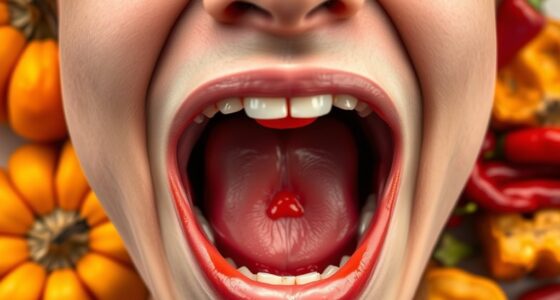Smoking devastates your teeth and gums, leading to severe oral health issues. You'll likely notice yellow or brown stains on your teeth, as nicotine and tar take their toll. Your risk of developing gum disease doubles, which can result in painful symptoms, receding gums, and tooth loss. Recovery after dental procedures becomes complicated and lengthy due to impaired healing. Additionally, smoking greatly increases your risk of oral cancer. It's essential to recognize these negative impacts early. Understanding the full scope of smoking's effects can empower you to take action for better oral health.
Key Takeaways
- Smoking causes significant tooth discoloration, leading to yellow or brown stains that are difficult to remove.
- Smokers are at an 80% increased risk of developing gum disease, which can result in tooth loss.
- A weakened immune response in smokers slows healing after dental procedures, increasing the risk of complications.
- Smoking contributes to bad breath and dry mouth, further exacerbating oral health problems.
Overview of Smoking Effects

Smoking has a profound impact on your oral health, leading to issues like tooth discoloration, gum disease, and an increased risk of oral cancers. Smoking can also contribute to bad breath, a loss of taste and smell, and slower healing after dental procedures. What’s even more concerning is the shocking impact of smoking on kids, as secondhand smoke can also lead to oral health problems such as cavities and gum disease. It’s important for smokers to be aware of the potential harm it can cause to their own oral health as well as those around them.
When you smoke, the nicotine and tar in tobacco products stain your teeth, making them appear yellow or brown. This discoloration isn't just cosmetic; it's a sign of deeper oral health problems. Smokers face an 80% higher risk of developing gum disease, which can lead to painful conditions like gum recession and tooth loss.
Moreover, tobacco use contributes to bad breath and dry mouth, both of which worsen gum disease. A compromised immune system due to smoking also means your body struggles to heal after dental procedures. This delay can lead to infections and other complications. Additionally, smokers experience a higher prevalence of mouth sores and ulcers, which can further exacerbate oral health issues if not addressed promptly.
As you can see, the consequences of smoking extend far beyond just your teeth. Protecting your oral health means understanding these risks and considering the impact of smoking on your overall wellbeing.
Connection Between Smoking and Gum Disease

The connection between cigarette use and gum disease is alarming, as smokers face double the risk of developing this serious oral health issue.
Smoking weakens your immune system, making it harder for your body to fight off infections, including those affecting your gums. This impairment accelerates the progression of gum disease, pushing you towards severe stages like periodontitis, which can ultimately lead to tooth loss.
You mightn't notice symptoms such as swollen or bleeding gums as easily if you smoke, due to reduced blood supply in your mouth. Additionally, smoking diminishes the effectiveness of treatments, making recovery more difficult. This means that if you're a smoker, you're not just increasing your risk factors for gum disease; you're also complicating your path to recovery.
To combat these challenges, it's essential to maintain regular dental check-ups and practice good oral hygiene. Your dentist can help monitor your gums and provide guidance tailored to your needs as a smoker.
Symptoms of Oral Health Issues

When you smoke, your mouth can show various troubling symptoms that signal serious oral health issues.
You might notice red or swollen gums, persistent bad breath, or even painful chewing.
It's vital to recognize these signs early, as they can indicate gum disease or even mouth cancer.
Common Oral Symptoms
Experiencing red, swollen gums can be a clear sign of gum disease, especially for those who smoke. Smoking greatly increases your risk of developing these oral symptoms. You might notice tender gums that bleed when you brush or floss, indicating inflammation linked to tobacco use.
If you're finding that your gums are receding, it's another red flag. Receding gums can expose the roots of your teeth, leading to increased sensitivity and discomfort.
Persistent bad breath is another common issue for smokers. This isn't just an inconvenience; it often relates to gum disease and dry mouth, both worsened by smoking. As your oral health declines, you might even experience loose teeth, which signals advanced gum disease. Smokers face double the risk of this condition compared to non-smokers, making it vital to pay attention to these symptoms.
If you notice any of these signs, it's important to consult with a dental professional. Addressing gum disease early can help preserve your oral health and prevent more severe complications down the line.
Prioritize your oral hygiene and stay aware of these common symptoms to keep your smile healthy.
Signs of Gum Disease
Recognizing early signs of gum disease is crucial for maintaining your oral health, especially if you smoke. Symptoms of gum disease often begin with red or swollen gums, a clear indicator of inflammation caused by plaque and tartar buildup. If you notice your gums bleeding while brushing or flossing, it could be a sign of gingivitis, the initial stage of gum disease.
As the condition progresses, you may experience painful chewing and increased sensitivity in your teeth. These symptoms indicate that gum disease is affecting the supporting structures of your teeth. In advanced stages, loose teeth can become a reality, signaling severe damage to the bone structure that holds your teeth in place.
Regular visits to your dentist are essential for detecting gum disease early, particularly since symptoms may be less noticeable in smokers due to reduced blood supply. If you're considering smoking cessation, know that quitting can greatly improve your gum health over time.
Don't ignore these warning signs; staying proactive about your oral health can save you from serious complications down the line.
Indicators of Mouth Cancer
Persistent ulcers that refuse to heal can be a warning sign of mouth cancer, especially for those who smoke or use tobacco products. If you notice unexplained swelling in your mouth or gums, it's essential to seek medical advice. Smokers are at a markedly higher risk for oral cancer due to the harmful chemicals in tobacco that cause cellular mutations. Other symptoms to watch for include difficulty swallowing, a persistent sore throat, and changes in your voice, all of which can be worsened by smoking.
Regular dental check-ups are key in catching these symptoms early. Below is a table summarizing common indicators of mouth cancer:
| Symptom | Description |
|---|---|
| Persistent ulcers | Ulcers that don't heal within 2-3 weeks |
| Unexplained swelling | Swelling in the mouth or gums |
| Difficulty swallowing | Trouble swallowing food or liquids |
| Changes in voice | Alterations in your tone or clarity |
Recognizing these symptoms early can make a notable difference in your prognosis, so stay vigilant and proactive about your oral health.
Impact on Healing After Procedures

Smoking notably delays healing after dental procedures, leading to complications that can hinder your recovery. When you smoke, impaired blood flow and a weakened immune response increase the risk of post-surgical issues like dry socket and infection. Studies show that your likelihood of facing complications, such as prolonged bleeding and poor wound healing, is greatly higher if you smoke.
After oral surgeries, you might experience higher pain levels and discomfort, complicating your recovery further. This can seriously impact your overall oral health and well-being. If you're considering dental implants, it's vital to know that smoking can lower their success rate due to its interference with the implant's integration with the bone.
Moreover, smoking contributes to gum disease, which can worsen the healing process and lead to further complications. By quitting smoking, you can greatly improve your body's ability to heal and reduce the risks associated with dental procedures. Taking this step not only enhances your recovery but also promotes better long-term oral health.
Ultimately, prioritizing your healing process is essential for maintaining a healthy mouth.
Increased Risk of Oral Cancer

Tobacco use dramatically increases your chances of developing oral cancer, making it vital to understand the risks involved. Studies show that if you're a smoker, you're six times more likely to be diagnosed with oral cancer compared to non-smokers. With tobacco responsible for around 90% of all oral cavity cancers, the dangers to your oral health can't be overstated.
The harmful chemicals in smoking can cause mutations in the healthy cells of your mouth and throat, leading to cancerous growths. This means that when you smoke, you're not just jeopardizing your teeth but also putting your overall health at risk. Smokers often face chronic conditions like gum disease, which can complicate treatment if oral cancer develops.
Additionally, healing after surgeries becomes more challenging due to these health risks. Regular dental check-ups are essential for early detection of oral cancer, especially if you experience symptoms like persistent ulcers or unexplained swelling in your mouth.
Staying informed about these risks can empower you to make healthier choices for your oral health and well-being.
Vaping and Oral Health Risks

While smoking poses considerable risks to oral health, vaping also introduces a range of harmful effects that can jeopardize your teeth and gums. Many people mistakenly believe that vaping is a safer alternative, but it can lead to serious issues like gum disease and tooth decay. Even e-liquids marketed as nicotine-free contain harmful substances, including heavy metals and cancer-causing chemicals.
If you're using nicotine-containing e-liquids, your risk of oral problems increases considerably. Vaping can cause dry mouth, which reduces saliva and heightens the risk of cavities and gum inflammation. Just like traditional smoking, these effects can lead to long-term damage to your oral health.
The flavoring agents in vape liquids may also harm your tooth enamel, compounding the risk of dental issues over time. While research on the long-term effects of vaping on oral health is ongoing, it's clear that smoking and vaping share many harmful consequences.
To reduce the risk of these oral health problems, consider quitting both habits and seeking healthier alternatives. Your teeth and gums will thank you for it.
Preventive Measures for Smokers

To protect your teeth while smoking, it's essential to maintain a daily oral hygiene routine.
Regular dental check-ups can help catch issues early, giving you a better chance at preventing serious problems.
Plus, seeking smoking cessation support can greatly improve your oral health and overall well-being.
Daily Oral Hygiene Routine
How can you maintain a healthy smile as a smoker? It's essential to adopt a diligent daily oral hygiene routine. Start by brushing your teeth at least twice a day with fluoride toothpaste. This helps combat plaque buildup, which is particularly important since smokers are at a higher risk for gum disease. Don't forget about daily flossing; this is key to removing food particles and plaque between your teeth.
Here's a helpful table to guide you on your daily routine:
| Step | Frequency | Purpose |
|---|---|---|
| Brushing | Twice daily | Reduces plaque and gum disease risk |
| Daily Flossing | Daily | Prevents cavities and improves health |
| Antibacterial Mouthwash | After meals | Controls bad breath and bacteria |
| Hydration | Throughout the day | Alleviates dry mouth |
| Regular Dental Check-ups | Every 6-12 months | Monitors oral health |
Regular Dental Check-Ups
Regular dental check-ups are essential for smokers to catch oral health issues early and prevent serious complications. Since you're at a higher risk for gum disease and tooth loss, visiting your dentist every 6-12 months can make a significant difference.
During these appointments, dental professionals can perform cleanings that remove plaque and tartar buildup, which tend to accumulate more in smokers due to compromised oral health.
It's also important to inform your dentist about your smoking habits. This information influences your treatment plan and the preventive measures recommended during your visits.
Your dentist can provide tailored advice on improving your oral hygiene practices, including tips for managing dry mouth and battling bad breath.
Smoking Cessation Support Resources
Quitting smoking is an essential step in improving your oral health, and there are numerous support resources available to help you on this journey.
Consulting a doctor is a great first move; they can provide personalized strategies tailored to your needs. The Quitline, reachable at 13 7848 (13 QUIT), offers dedicated support and resources that can assist you in your smoking cessation efforts.
You can also reach out to the Australian Dental Association, which can help you locate local dentists who specialize in oral health care for smokers. They can offer advice on maintaining your dental health while you work to quit smoking.
Additionally, Dental Health Services Victoria provides public dental services and can be contacted at (03) 9341 1000 or 1800 833 039 for accessible care options.
Strategies for Quitting Smoking

Setting a specific quit date gives you a clear goal and motivation to stop smoking, making the process more structured and manageable.
To enhance your chances of success, consider incorporating several strategies into your quitting plan:
- Utilize support systems: Engage friends, family, or healthcare providers to create a network of encouragement.
- Explore nicotine replacement therapies: Discuss options with your healthcare provider to find what works best for you.
- Stay active: Engage in hobbies or exercise to distract yourself from cravings and keep your mind occupied.
Support Resources for Smokers

If you're looking to quit smoking, there are several support resources that can help you along the way.
Cessation support programs can provide you with strategies and encouragement, while dental care assistance guarantees your oral health is taken care of during this change.
Cessation Support Programs
Cessation support programs, like the Quitline, provide valuable resources and guidance to help you navigate the challenges of smoking cessation. When you're ready to quit smoking, these programs can assist you in making informed decisions that positively impact your oral health.
Here are some key benefits of engaging with cessation support programs:
- Access to professional support: Call the Quitline at 13 7848 (13 QUIT) for personalized assistance.
- Customized quitting strategies: Consult with a doctor for tailored plans that address your unique needs.
- Information on oral health: Learn about the effects of smoking on your teeth and gums, and how to mitigate these issues.
Utilizing these resources can greatly enhance your chances of successfully quitting smoking while safeguarding your oral health.
Remember, the journey may be challenging, but with the right support, you can achieve your goal of becoming smoke-free.
Take that essential first step towards a healthier future!
Dental Care Assistance
As you work towards quitting smoking, accessing dental care assistance can play an important role in maintaining your oral health and addressing specific issues related to tobacco use.
Smoking greatly increases the risk of gum disease, which can lead to tooth loss if left untreated. Regular dental check-ups are critical for monitoring your oral health, especially as a smoker. These visits allow your dentist to identify any potential problems early and provide tailored advice to improve your dental care routine.
You can reach out to services like the Quitline at 13 7848 (13 QUIT) for support in your journey to quit smoking. Additionally, Dental Health Services Victoria offers public dental services at (03) 9341 1000 or 1800 833 039, ensuring you have access to professional care.
Educational resources on maintaining good oral hygiene are also fundamental for smokers. These can help reduce your risk of developing oral diseases related to smoking.
Long-term Consequences of Smoking

Long-term smoking can wreak havoc on your oral health, leading to serious issues like periodontal disease and tooth loss. Tobacco causes significant damage to your gums and teeth, compromising your overall health. It's important to grasp the long-term consequences you might face:
- Increased risk of gum disease, with smokers twice as likely to develop it compared to non-smokers.
- Higher chances of tooth loss due to the detrimental effects of tobacco on the supporting structures of your teeth.
- Severe discoloration of teeth, leading to yellowing and staining that often requires professional whitening treatments.
Moreover, long-term smoking is strongly linked to oral cancers, making it the leading preventable cause of these malignancies.
The persistent exposure to nicotine and tar not only harms your teeth but also poses serious threats to your overall well-being.
If you smoke, it's vital to think about quitting to protect your oral health and reduce the risk of these life-altering consequences.
Take action now for a healthier future!
Frequently Asked Questions
How Does Smoking Affect Your Teeth?
Smoking stains your teeth, making them yellow and dull. It increases your risk of gum disease and tooth loss, and it can lead to bad breath and dry mouth, complicating your overall oral health.
How Do You Reverse Smoke Damage to Your Teeth?
To reverse smoke damage, you might try a professional whitening treatment, like Sarah did after years of smoking. She noticed a significant improvement, but remember, quitting smoking and diligent oral hygiene are essential for lasting results.
Will My Teeth Get Better if I Quit Smoking?
Yes, your teeth will get better if you quit smoking. You'll notice improved gum health, reduced staining, and a brighter smile. Plus, you'll experience fresher breath and better taste over time. It's worth it!
Can Smoking Make Your Teeth Feel Weird?
Did you know that nearly 50% of smokers report dental discomfort? Yes, smoking can definitely make your teeth feel weird. It affects sensitivity, taste, and can even lead to a strange sensation during everyday activities.
Can Smoking Cause Kidney Issues and Bad Teeth?
Smoking has been linked to various health issues, including kidney issues and dental health. The chemicals in cigarettes can harm the kidneys and contribute to chronic kidney disease. Additionally, smoking can lead to gum disease, tooth decay, and tooth loss, affecting overall dental health. It’s important to quit smoking to protect kidney function and maintain good oral health.
Conclusion
In the battle for a healthy smile, smoking stands as a formidable enemy, darkening your teeth and undermining your oral health.
While the allure of a cigarette may seem tempting, the stark reality is that it leads to gum disease, painful procedures, and even cancer.
You can choose to fight back, reclaiming your smile and health. Quitting smoking not only brightens your future but also restores your confidence.
Don't let smoke cloud the beauty of your smile—take the first step today.









